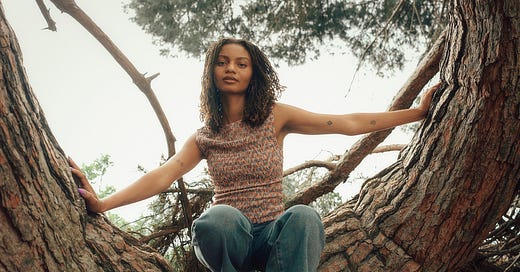Hi Soilpunks,
Today marks the longest day of the year, the Summer Solstice, and the launch of Issue 2: THE GARDEN. Check out the cover art and get a peek of all the stories to come here. 🌿
We’re also so excited to introduce Tractor Beam’s first ever guest editor, Leah Thomas (@greengirlleah)! 𓇼 ⋆.˚ 𓆉 𓆝 𓆡⋆.˚ 𓇼 𓆉 𓆝
Leah Thomas is an award-winning environmentalist based in Los Angeles. A passionate advocate for the often-overlooked intersection between social justice, environmentalism, and culture, her work is shaped through the lens of eco-feminism. She is the author of the bestselling The Intersectional Environmentalist, a widely taught resource in university classrooms nationwide.
In 2024, Leah founded Green Girl Productions, a media company that produces cultural and community events around environmental and social issues across the country. She is the founder of
, a groundbreaking non-profit and resource hub, where she currently serves as a board member. Beyond her advocacy, she has also lent her expertise as a climate solutions consultant for major companies like Apple.As a leading voice in the environmental space, Leah understands how to enact tangible change on a community and societal level by making environmentalism both digestible and accessible. Recognized on Forbes 30 Under 30 List and TIME100 NEXT, Leah is an established public speaker who has presented on prestigious stages including Dreamforce, TED, and Aspen Ideas. In her free time, Leah finds creative expression through crafting as an act of self-care and community-building, and to inspire her audience to embrace more sustainable, hands-on practices.
She shared with us exactly what The Garden means to her…
In the garden there is no time, there is no place, only earth.
Every garden holds memories of the past within the soil. Just like humans, microbes come together in community and dance around roots and frolic with fungi–storytelling beneath our feet.
The almost mystical nature of *nature* is why I've gravitated towards eco-communication and trying to put words to the ways the earth has inspired me and the lessons I've learned by bearing witness to it. I grew up in a family of environmentalists who would never call themselves that; a great grandmother who'd pop cherry tomatoes in my mouth in the spring time, and my grandmother Janice with a sacred garden with murals and fantastical art projects sprinkled throughout. It took me a long time to realize how gardens themselves actually influenced me to care deeply about the planet and how they inspired me to become an eco-feminist author, because all I saw were women in nature. Digging in the soil, getting dirty, being the most ethereal Black women I'd ever seen.
“Digging in the soil, getting dirty, being the most ethereal Black women I'd ever seen.”
My grandma encouraged me to play in the water, never be fearful of tadpoles and toads, and marvel at the fireflies in her backyard oasis in the middle of north Saint Louis City. It felt like a protected space where time stood still, even in one of the most dangerous areas of the city.
Growing up I honestly thought to be Black was to garden, and be of the earth, and to sit outside on the patio and build a community surrounded by native plants in the midwest -- even without much thought. That's just the way life was. I'd hear stories from my uncle Reggie about unjust systems and go to protests with my parents when I was in kindergarten. They baked a love for social justice, the Earth, and the possibilities of the future in me. Because, to be Black also meant to be futuristic; always holding lessons from the past, with strategies of the present, to radically imagine a better, more equitable future, for us.
“They baked a love for social justice, the Earth, and the possibilities of the future in me.”
Maybe that's why I love science fiction. It's a tool that allows us to envision new worlds that go beyond the confines of a narrative we’re so often fed: that the future will be bleak and without hope. That's not something I've ever believed, because deep within me lies the same hope that my ancestors had.
What if the future has advanced biotechnology that integrates nature? Or, perhaps the future has no technology at all and we return to coexisting as one with the land?
Anything is possible with our imagination, and science fiction is a vehicle to help plant ideas of what a better future for all people and the planet could look like.
This issue of Tractor Beam is a tribute to the sacred relationship between the past, present and future through the lens of soil.
Welcome to the garden.
Leah Thomas
Ecofeminist, Author of The Intersectional Environmentalist
Stay tuned…
Make you’re subscribed to get the first look at all of Issue 2’s stories as they drop on our website, right here on Substack and in your inbox!
Know someone who is an avid sci-fi reader, passionate about climate work, or loves to get their hands dirty in the soil? Spread the word and share our newsletter. And give us a follow on Bluesky and Instagram to stay connected on the latest. Let’s grow a better future together.







